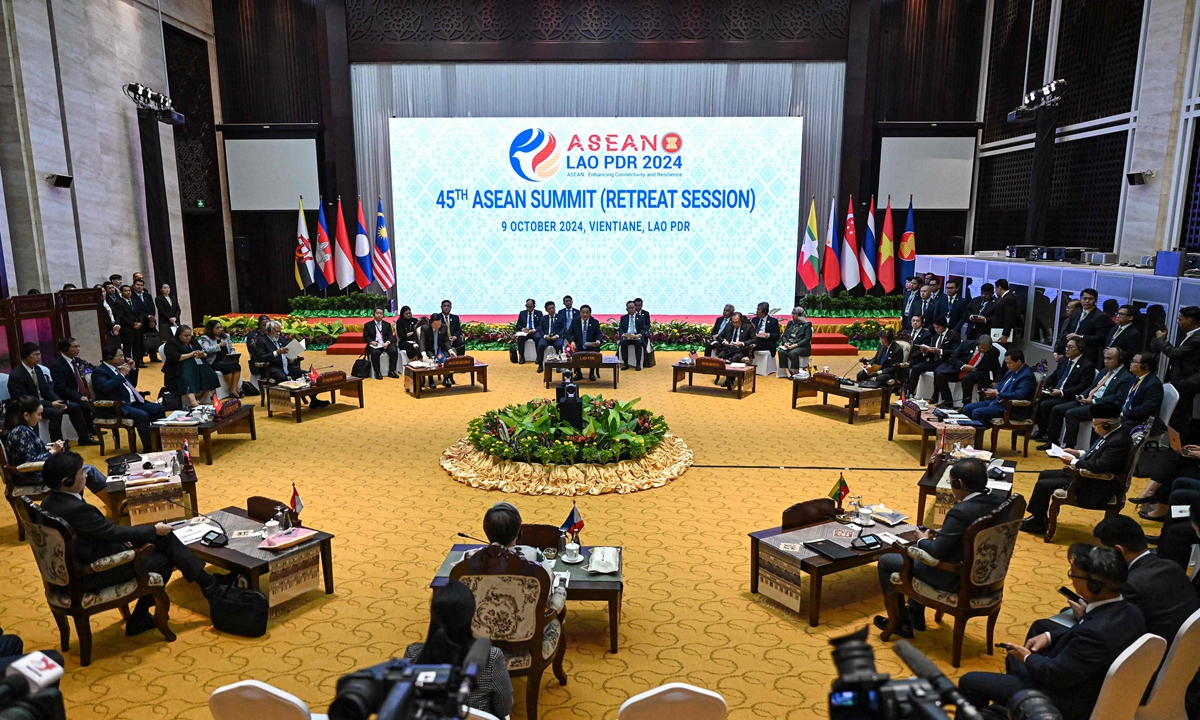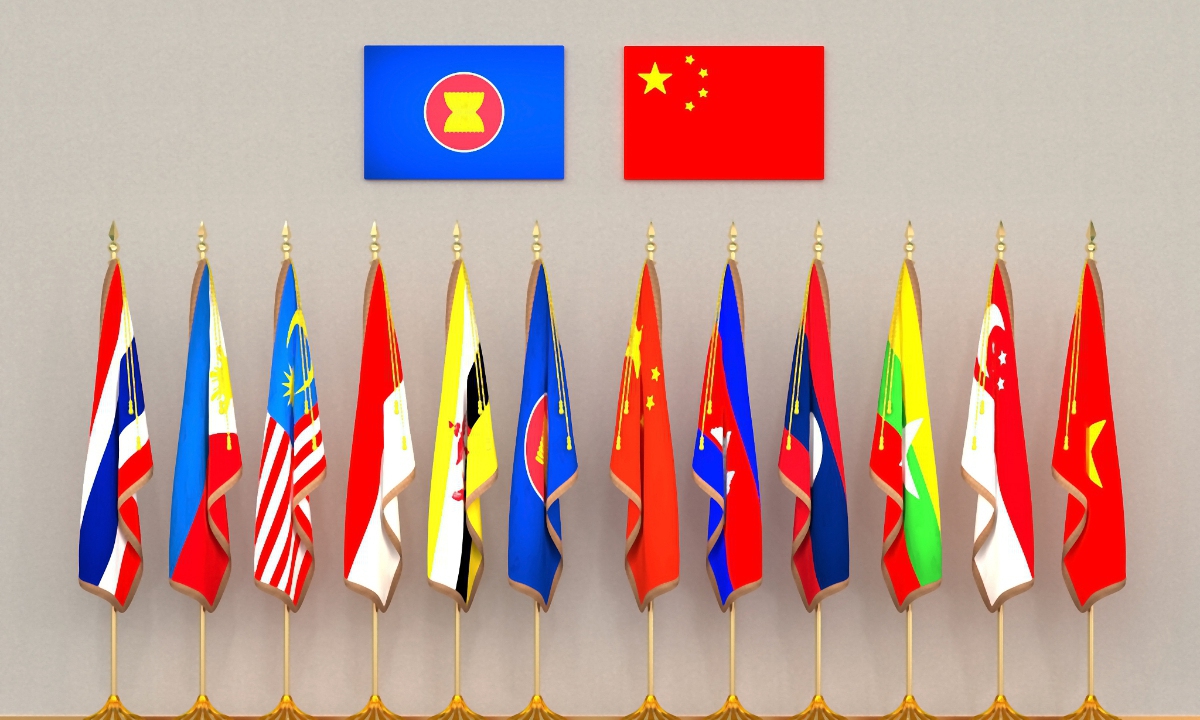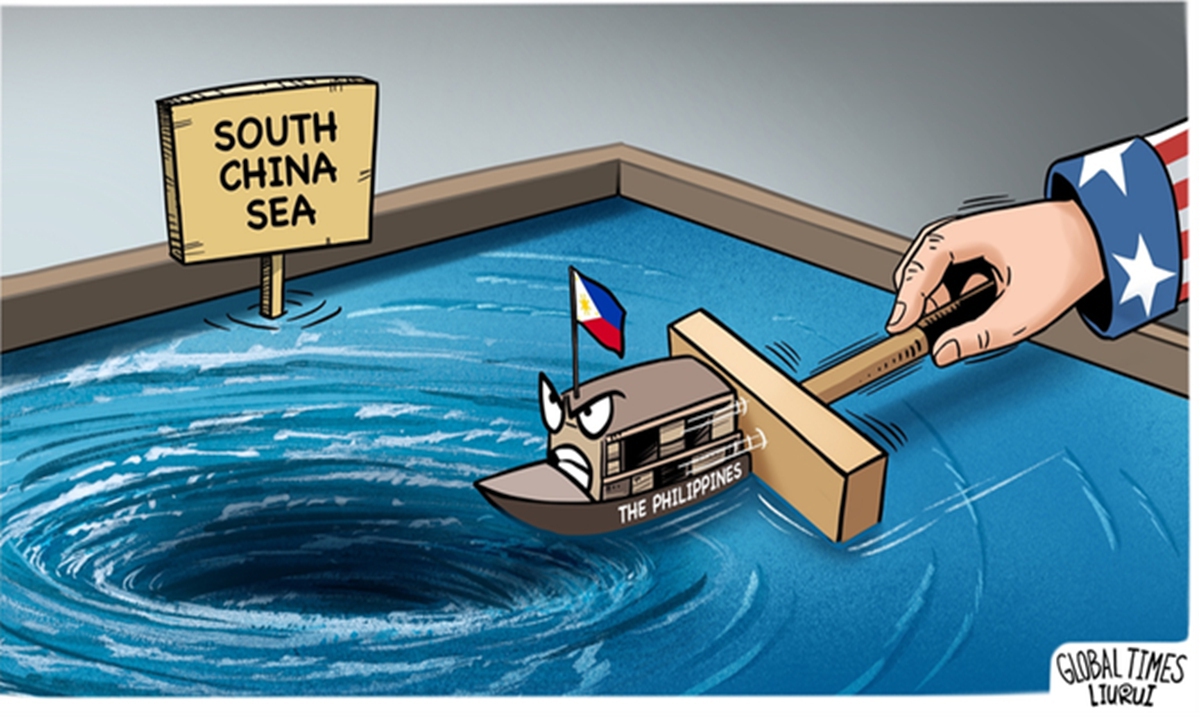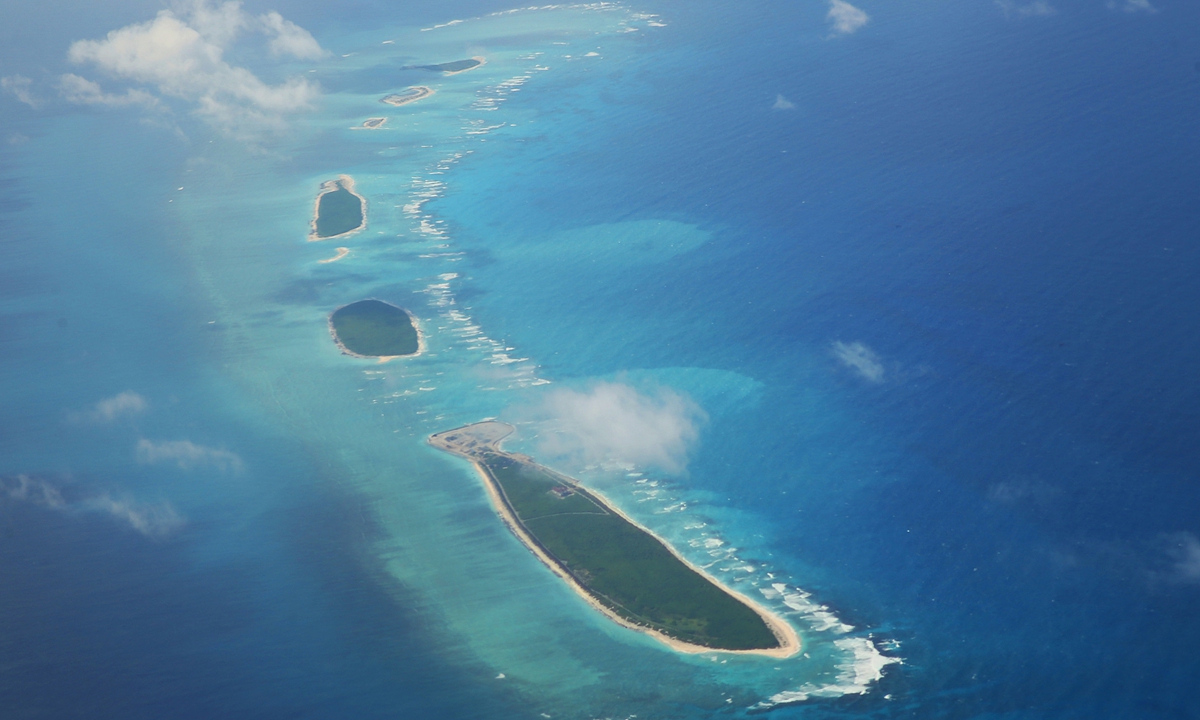ASEAN summit kicks off, expands potential of cooperation between China and bloc
Summit will highlight consensus between China and regional countries in resolving disputes via dialogue

Lao Prime Minister Sonexay Siphandone (center) leads the 45th Association of Southeast Asian Nations Summit in Vientiane on October 9, 2024. Photo: VCG
ASEAN's commitment to accelerating development and enhancing connectivity has expanded its cooperation potential with China, ASEAN's largest trading partner. Additionally, discussions surrounding security issues, such as those in the South China Sea, will highlight the consensus between China and ASEAN to resolve disputes through dialogue, according to Chinese experts.
In contrast to China's mutually beneficial and peace-promoting approach in collaborating with ASEAN members, the US' tendency to form small alliances and use the ASEAN as a pawn in geopolitical competition undermines regional countries' aspirations for peaceful development, experts noted.
Lao Prime Minister Sonexay Siphandone welcomed new leaders from Thailand and Singapore to the summit in his opening speech on Wednesday. He said Laos, the current ASEAN chair, aims to help members work together to manage geopolitical and economic challenges under its chairmanship.
"We help one another, and work together the ASEAN way," he said.
"We will discuss and strengthen cooperation between ASEAN members and other dialogue partners, along with upholding the unity and centrality of ASEAN," he was quoted as saying by the AP.
Chinese Premier Li Qiang will attend the 27th China-ASEAN Summit, the 27th ASEAN Plus Three Summit and the 19th East Asia Summit to be held in Vientiane, Laos, from October 9 to 12, and pay an official visit to Laos, Chinese Foreign Ministry spokesperson Mao Ning announced on Tuesday.
Li's visit is at the invitation of Prime Minister Sonexay Siphandone of the Lao People's Democratic Republic, the current ASEAN chair, the spokesperson said.
Li will also pay an official visit to Vietnam from October 12 to 14, at the invitation of Prime Minister Pham Minh Chinh of Vietnam, Mao said.
The theme for Lao PDR's ASEAN Chairmanship in 2024 is "ASEAN: Enhancing Connectivity and Resilience." Enhancing connectivity and resilience is of utmost importance to ensure ASEAN collective efforts in the strengthening of the ASEAN community to seize opportunities and address present and emerging challenges effectively, according to ASEAN website.
Currently, ASEAN member countries are still focused on development issues, but ASEAN is facing some challenges. For example, economically, there are significant disparities in the levels of development among member states, Ge Hongliang, vice dean of the ASEAN College at the Guangxi Minzu University, told the Global Times on Wednesday.
As both China and ASEAN members are pushing forward economic recovery after the pandemic, the two sides share great potential in enhancing bilateral cooperation in terms of regional economic resilience and in restructuring and upgrading industrial chains, said Ge.
Especially since the RCEP entered into force in 2022, China and some ASEAN member countries have made significant efforts in terms of overall economic development and integration in the region, particularly in the area of trade and investment liberalization, said experts.
Premier Li's ongoing trip to the ASEAN is expected to boost bilateral relations, foster deeper substantive cooperation, and enhance people-to-people exchanges, which will further catalyze regional peace, stability and prosperity, Chen Xiangmiao, director of the World Navy Research Center at the National Institute for South China Sea Studies, told the Global Times on Wednesday.
A peaceful solution of the South China Sea dispute is what most ASEAN members want to see and those countries are against further escalation of the situation, said Ge. That said, the hyping of the South China Sea issue at the summit is not welcomed by all except a few certain countries.
Chen noted that Laos, as the current chair of ASEAN, is not directly involved in the South China Sea issue and holds significant influence over the agenda for the ASEAN Summit. As a result, discussions regarding the South China Sea issue are expected to be relatively moderate and will not be dominated by the position of any single country.
US sowing discord
US Secretary of State Antony Blinken will represent the US at summits with Asian leaders in Laos this week and expects to discuss human rights in Myanmar, China's "irresponsible" behavior in the South China Sea and Ukraine, US officials said on Tuesday, as Reuters reported.
US Assistant Secretary of State for East Asian and Pacific Affairs Daniel Kritenbrink told reporters that a number of China-related issues would come up during Blinken's trip, including its "escalatory and irresponsible steps designed to coerce and pressure many of the South China Sea claimants."
On the Ukraine crisis, he said: "Our concerns regarding China's strong support for the Russian defense industrial base, they remain, they are ongoing, and I would say they are growing."
Chen observed that Washington often employs international platforms to criticize China, turning these venues into arenas for China-US competition. This approach reflects a typical Cold War mentality, as the US views the ASEAN merely as a pawn in its efforts to counter China, while disregarding the region's desire for peaceful development and its growing resentment at being used as a tool in major geopolitical rivalries.
In the State of Southeast Asia 2024 survey conducted by the Singapore-based ISEAS-Yusof Ishak Institute in April this year, more than half of people in Southeast Asia said they would side with China over the US if forced to choose. China was also chosen as the most influential economic power in the region by most respondents, with 59.9 percent of respondents picking it over the US.
Emphasizing its support for Ukraine in both bilateral and multilateral settings is a hallmark of US policy. However, Southeast Asian countries maybe more concerned about the conflicts in the Middle East, said Chen. He noted that Islamic countries like Indonesia and Malaysia with huge Muslim population firmly support Palestinian and condemn Israel over the Gaza crisis and Israel's military operations that harm other nations in the Middle East. Therefore, the voices of Southeast Asian countries regarding the Middle East conflict may pose a challenge for the US, who has long indulged Israel, during this year's summit.
Earlier this month, speaking at the UN in New York, Malaysian Foreign Minister Mohamad Hassan demanded that the UN Security Council impose an immediate arms embargo against Israel. "They have already crossed the line, and we need to take drastic action to curb their barbarism," he said, according to Malaysian media Bernama.
Also speaking at the UN after the bombings that killed a senior Hezbollah leader, Indonesian Foreign Minister Retno Marsudi asked if the Security Council would take action to stop "Israel's atrocities" only when all Palestinians were displaced or if 100,000 had been killed.




